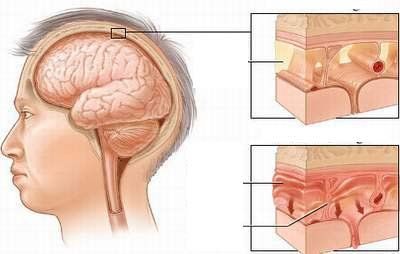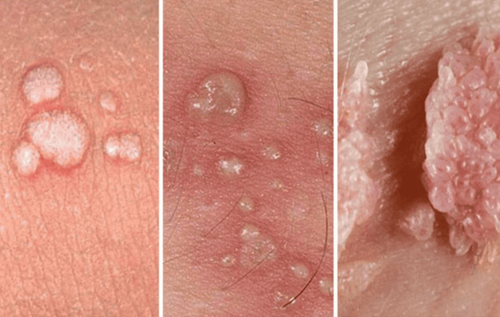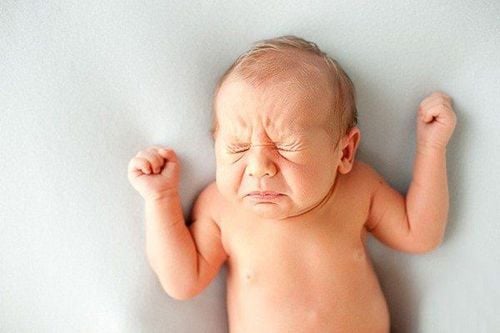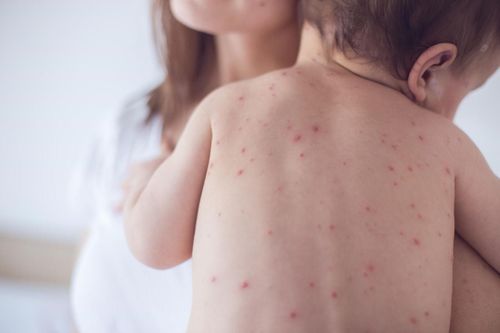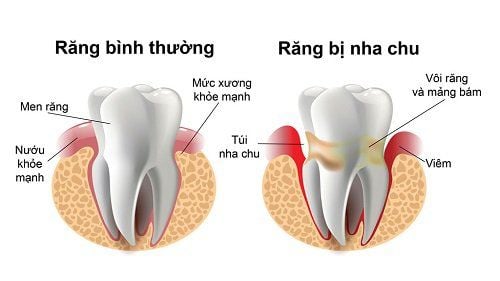Hand, foot and mouth disease is a common infectious disease in children. Most children with the disease will recover on their own, but some children still have complications affecting the brain, heart, etc. So, are startles in children with hand, foot and mouth disease a complication?
1. What is hand, foot and mouth disease?
Hand, foot and mouth disease is an infectious disease caused by intestinal viruses, most commonly Coxsackievirus A16 and Enterovirus 71 (EV71). The disease is easily transmitted through the digestive tract or by contact with blisters, feces, saliva, or nasal secretions.
EV71 is rare but causes extremely serious complications. According to statistics from the Department of Preventive Medicine, deaths from hand, foot and mouth disease are mainly caused by the EV71 virus strain, in which the most common death is in children under 3 years old.
Hand, foot and mouth disease is a disease in young children and there is no vaccine to prevent it. Most children with the disease will recover on their own. Although it is considered a benign disease and can be completely cured, if not detected and treated promptly, it can lead to very dangerous complications such as Meningitis, encephalitis, and myocardial damage..., seriously affecting the health of young children. Children with damaged hearts and difficulty breathing can easily progress to circulatory failure, which can lead to death.
When suffering from hand, foot and mouth disease, blisters will first appear. If the blisters are in the mouth, they will usually burst, forming ulcers, while blisters on the palms of the hands, soles of the feet, knees, and buttocks will usually not burst, but will gradually dry up and heal. The course of the disease usually lasts from 5 to 7 days and can last more than 10 days.
About 90% of children with hand, foot and mouth disease will recover on their own. The remaining children may have some complications such as affecting the brain causing respiratory failure, affecting the heart causing myocarditis, heart failure, causing acute pulmonary edema...
When children show signs of complications, they need to be taken to the hospital immediately, because the time to save the child's life at this time is only about 6-12 hours.
Startled and dizzy is one of the three typical severe symptoms of hand, foot and mouth disease. This is a sign that the child has been infected with neurotoxin, if not treated promptly, it can cause dangerous complications such as encephalitis, meningitis, encephalomyelitis,...
2. Is being startled in hand, foot and mouth disease a complication?
The signs of startled in hand, foot and mouth disease in children are quite special. Children will often be startled and dizzy when parents put them down. You can recognize the signs of being startled in children as follows:
• The child may suddenly jolt awake during sleep, with all four limbs raised, and eyes opening, gazing up, before sleep resumes. If the condition is more severe, the child will be startled repeatedly, even when in deep sleep. There are many cases where the child was startled just lying on his back.
• The child Is startled even while playing. Parents should pay attention to whether the frequency of their child's startle reflex increases over time.
In addition, some children show signs of unsteady gait as usual or continuous vomiting. Some other children show signs of slight tremors of the hands or body. Some children also show signs of labored breathing, abnormal breathing, lethargic sleep without waking up to play, or children may have cold sweats. These are signs that parents need to take their children to the hospital immediately.
In addition to the symptoms of being startled and dizzy, there are two other signs of hand, foot and mouth disease that parents need to pay close attention to. If these signs appear, they need to take their children to the hospital immediately for timely treatment:
• In the very early stages: Children may cry excessively, not sleeping through the night, waking up every 15-20 minutes to cry for about 15-20 minutes and then falling back to sleep, causing many parents to think that the sores in the mouth are making the child have trouble sleeping.
• Due to the body's very strong inflammatory response, it causes neurotoxicity: Children with fever above 38 degrees for more than 48 hours do not respond to conventional antipyretics. For example, children with high fever of 39 - 40 degrees that does not respond to antipyretics, the temperature is not significant, and even then the child continues to have a high fever. If the child's fever is not high or can be reduced, but the child has a fever for more than 48 hours, you should take the child to see a doctor immediately.
According to specialists, parents need to monitor and recognize early symptoms of hand, foot and mouth disease to avoid serious progression. Early symptoms include:
• Children have symptoms such as mouth sores, mouth ulcers.
• Children have rashes, sores or blisters on the palms of the hands, soles of the feet, buttocks, knees or elbows.
It should be noted that there are also cases where children have skin lesions all over the body, which are difficult to distinguish from rashes. Some children even have very large blisters that can be easily mistaken for chickenpox. Sometimes, children may develop oral ulcers, and parents might assume it is due to teething, as the child only exhibits symptoms such as poor appetite or drooling.
3. How to care for children with hand, foot and mouth disease
The way to care for children with hand, foot and mouth disease is mainly the child's diet because when the child is sick, it will be very difficult to eat. You should feed your child liquid, easy-to-digest foods. If the child has a lot of mouth pain, you need to take the child to see a doctor to get a pain reliever for the mouth. If well cared for, recovery should start after 5-7 days.
However, the most important thing is to monitor to detect complications early with signs such as startle, change in sleep. If there is a delay, the child may have symptoms such as respiratory distress, seizures, tachycardia, followed by pulselessness.
You can proactively prevent hand, foot and mouth disease in children with very simple measures, which should be done every day such as:
• Instruct children to wash their hands regularly with soap.
• Adults must always wash their hands after caring for children, changing diapers for children, after coughing or sneezing, after going to the toilet, before preparing food.
• Do not let children touch places that have not been disinfected.
• Clean the items children use every day.
• In particular, keep children away from children who are sick or have signs of suspected hand, foot and mouth disease.
The Department of Pediatrics - Vinmec International General Hospital is a trusted facility to receive and examine diseases that infants and young children are susceptible to: Viral fever, bacterial fever, otitis media, pneumonia in children, hand, foot and mouth disease... With modern equipment, sterile space, minimizing the impact as well as the risk of spreading the disease. Along with that is the dedication of experienced doctors with pediatric patients, making medical examinations no longer a worry for parents.
To arrange an appointment, please call HOTLINE or make your reservation directly HERE. You may also download the MyVinmec app to schedule appointments faster and manage your reservations more conveniently.




